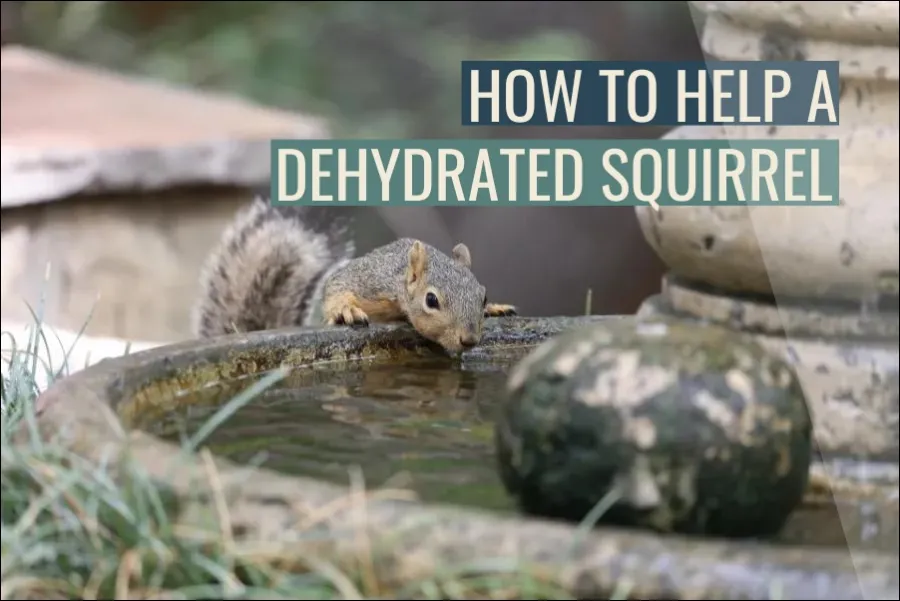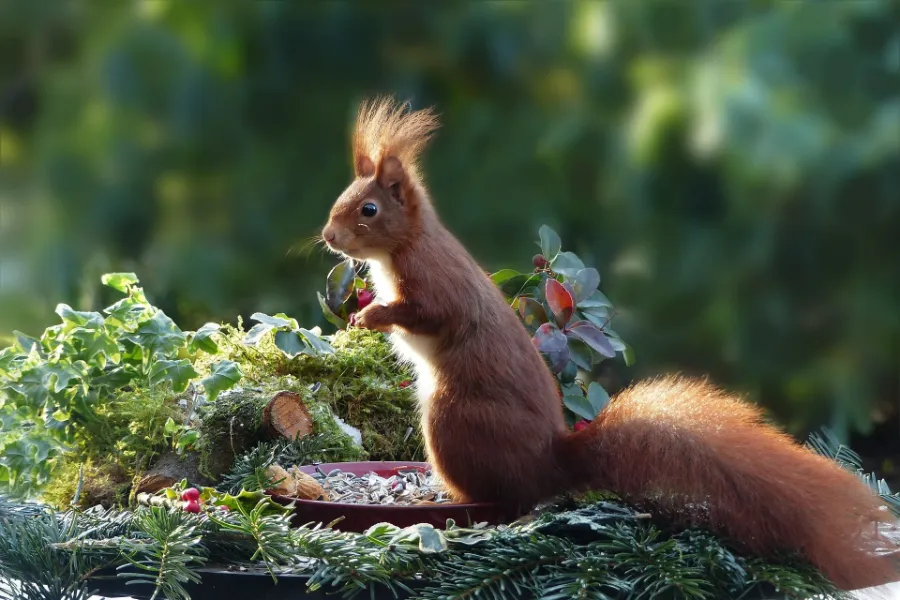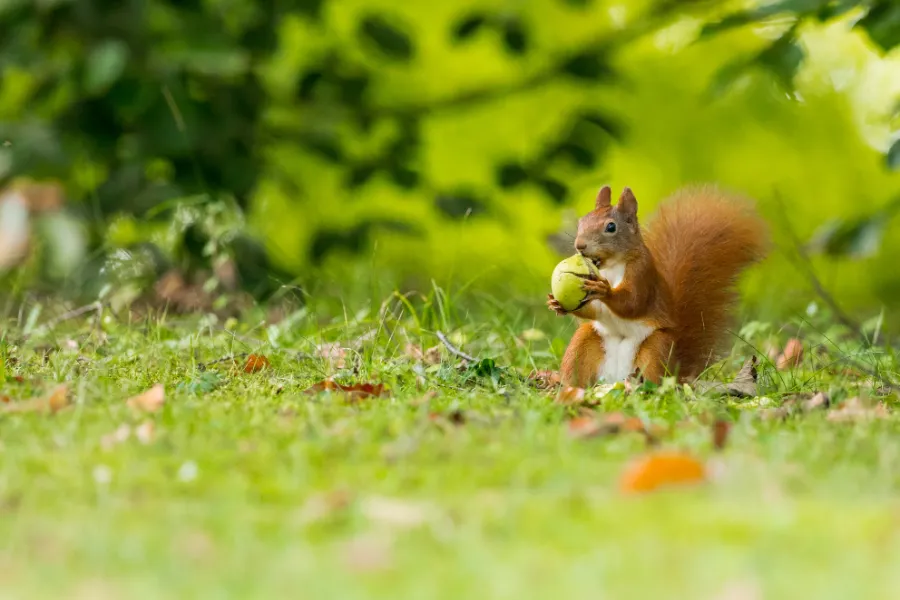
Squirrels are common animals in many parts of the world, and they are often seen as cute and playful. However, like all animals, squirrels can become sick or injured, and one common problem they face is dehydration.
To help a dehydrated squirrel, provide it with fluids and electrolytes, keep it cool and shaded, and seek medical care if necessary. Offer the squirrel water or an electrolyte solution using a syringe or eyedropper. If the squirrel is severely dehydrated or injured, seek veterinary care.
Dehydration can be serious, especially in hot weather or if the squirrel is sick or injured. In this article, we will look at how to recognize the signs of dehydration in a squirrel and what you can do to help a dehydrated squirrel. Here are the main points we will cover:
What is dehydration, and why is it important?
Dehydration is a condition that develops when the body lacks enough fluids. It can be caused by a number of circumstances, including hot weather, sickness, or injury. Small animals, such as squirrels, are more vulnerable to dehydration because they have a greater surface-to-volume ratio and are more sensitive to heatstroke.
The body does not operate correctly when it is dehydrated. Fluids are required by the body to regulate its temperature, drain away waste, and deliver nutrients and oxygen to cells. If the body does not have enough fluids, it will be unable to accomplish these essential activities, which can lead to major complications. Dehydration can result in weariness, disorientation, and muscular cramps, as well as a decrease in the body’s capacity to recover itself. Dehydration can cause organ damage and even death in extreme circumstances.
It is critical to detect the indicators of dehydration and take preventative measures, especially if the squirrel is unwell or wounded. You can assist avoid dehydration and keep the squirrel healthy and happy by giving it access to water, shade, and cool temperatures.
How to recognize the signs of dehydration in a squirrel
Dehydration can be difficult to detect, particularly in tiny animals such as squirrels. However, there are a few indicators that a squirrel is dehydrated that you may check for.
A dry or sticky lips is one of the most noticeable indications of dehydration. The squirrel may be dehydrated if its mouth is dry. Lethargy, sunken eyes, and skin that does not bounce back when squeezed are further indicators of dehydration. If the squirrel is dehydrated, its skin may feel dry or sticky, and it may not respond to a pinch.
Other symptoms of squirrel dehydration include a lack of energy, a decrease of appetite, and difficulties breathing. If the squirrel is dehydrated, it may appear sluggish, refuse to eat or drink, and have difficulties breathing.
It is critical to notice these indicators of dehydration as soon as possible so that you can assist the squirrel. You may assist the squirrel recuperate and avoid more serious issues from developing by giving it drinks and electrolytes.

How to provide first aid for a dehydrated squirrel
If you feel a squirrel is dehydrated, it is critical to administer first assistance as quickly as possible. There are a few things you can do to assist a dehydrated squirrel:
- Provide fluids and electrolytes to the squirrel. An electrolyte solution may be formed by combining the appropriate amounts of water, sugar, and salt. You may also use a syringe or eyedropper to give the squirrel water or an electrolyte solution.
- Maintain a cool, shaded environment for the squirrel. The squirrel may become hot if it is dehydrated. It is critical to keep the squirrel cool and sheltered as it recovers. You may do this by giving the squirrel with a box or other form of shelter and placing it in a cool, shaded location.
- Keep the squirrel calm and quiet. If the squirrel is dehydrated, it may become anxious or worried. It is critical to keep the squirrel quiet and tranquil in order to aid its recovery. Avoid touching the squirrel unless absolutely essential, and try to keep any noise or other distractions to a minimum.
How to prevent dehydration in squirrels
There are a few things you can do to keep squirrels hydrated:
Make water available. Ensure that the squirrel always has access to clean, fresh water. You may supply a water bottle or dish for the squirrel to drink from, or you can set up a shallow dish or birdbath for the squirrel to drink from.
Shade and cool temperatures should be provided. In warmer weather, squirrels are more prone to dehydration, thus it is critical to provide them with cover and moderate temperatures. This can be accomplished by placing the squirrel in a shaded place or by providing it with a box or other form of shelter.
Remove any heat sources. If the squirrel is kept in a too heated environment, it may get dehydrated. To avoid this, heat sources such as heat lamps or other heat-emitting equipment must be removed.
Handle the squirrel only when absolutely required. Handling the squirrel might stress it out, causing dehydration. If you must handle the squirrel, do it gently and with as little stress as possible.
When should a dehydrated squirrel seek veterinarian care?
If the squirrel looks to be wounded or unwell, it is critical that it get medical care as quickly as possible. A veterinarian will be able to examine the squirrel’s condition and treat it if needed.
If the squirrel is critically dehydrated, it may require hospitalization and intravenous fluids. In addition, the veterinarian may recommend drugs or other therapies to aid the squirrel’s recovery.
It is critical to seek veterinarian care as quickly as possible for a dehydrated squirrel, since dehydration can progress to significant issues if left untreated. You may assist the squirrel recover and avoid more serious complications by obtaining medical treatment.

How to make an electrolyte solution for a dehydrated squirrel
An electrolyte solution might be helpful in rehydrating a dehydrated squirrel. An electrolyte solution is a combination of water, sugar, and salt that aids in the replenishment of fluids and electrolytes lost by the squirrel.
You’ll need the following ingredients to produce an electrolyte solution for a squirrel:
- 1 liter of liquid
- four tablespoons sugar
- 1 tablespoon salt
Mix together the water, sugar, and salt until the sugar and salt are dissolved. You can provide the electrolyte solution to the squirrel with a syringe or eyedropper, or you can serve it in a shallow dish.
It should be noted that electrolyte solutions should only be used as a last resort. If the squirrel looks to be wounded or unwell, it is critical that it get medical care as quickly as possible.
How to feed a dehydrated squirrel
If a squirrel is dehydrated, it may lack energy and hunger. However, it is critical to encourage the squirrel to eat and drink as quickly as possible so that it can recover.
You can try to feed a dehydrated squirrel by taking the following steps:
- Provide tiny amounts of food and water to the squirrel. Begin by providing little amounts of food and drink to the squirrel, gradually increasing the quantity as the squirrel recovers. You may provide the squirrel with a variety of meals, including nuts, fruits, and veggies.
- Feed the squirrel using a syringe or an eyedropper. If the squirrel is too feeble to eat on its own, you can feed it with a syringe or eyedropper. Fill the syringe or eyedropper halfway with an electrolyte solution or water, then slowly spray it into the squirrel’s mouth. Avoid forcing the drink down the squirrel’s throat, since this may cause it to choke.
- Provide the squirrel with soft snacks. If the squirrel is unable to chew, feed it soft things such as mashed fruits and vegetables. You might also try giving the squirrel baby food or an electrolyte supplement.
- Please be patient. It might take some time for the squirrel to regain its appetite. Be patient and continue to provide little quantities of food and water to the squirrel until it is able to eat and drink on its own.
- If necessary, seek veterinarian care. If the squirrel is unable to eat or drink, or seems sick or injured, it should be sent to a veterinarian as soon as possible. A veterinarian will be able to examine the squirrel’s condition and treat it if needed.
How to provide water for a dehydrated squirrel
If a squirrel is dehydrated, it is important to provide it with water as soon as possible. There are a few steps you can take to provide water for a dehydrated squirrel:
- Offer the squirrel water or an electrolyte solution. You can use a syringe or eyedropper to give the squirrel water or an electrolyte solution, or you can offer it in a shallow dish.
- Make sure the squirrel has access to clean, fresh water at all times. Keep a water bottle or dish filled with clean, fresh water for the squirrel to drink from.
- Keep the squirrel cool and shaded. If the squirrel is dehydrated, it may be overheated. To help the squirrel recover, it is important to keep it cool and shaded. You can do this by providing the squirrel with a box or other shelter, and by placing it in a cool, shaded area.
- Remove sources of heat. If the squirrel is confined in an area that is too hot, it may become dehydrated. To prevent this, it is important to remove sources of heat, such as heat lamps or other heat-emitting devices.
What to do if you find an orphaned or injured squirrel
If you come across an orphaned or wounded squirrel, it is critical that you respond quickly. You may help the squirrel by taking the following steps:
- Maintain the squirrel’s safety. If the squirrel is wounded or unwell, it may be prey for predators. To safeguard the squirrel, put it in a safe, secure location until you can receive aid. This can be accomplished by placing the squirrel in a box or other container and keeping it away from any possible hazards.
- Give the squirrel some basic care. The squirrel may be thirsty or hungry if it is wounded or unwell. It is critical to supply the squirrel with basic care, such as fluids, food, and shelter, to aid in its recovery.
- Seek the assistance of a wildlife rehabilitation facility or a veterinarian. If the squirrel is orphaned or wounded, it is critical to get immediate assistance from a wildlife rehabilitation facility or veterinarian. A wildlife rehabilitation center or veterinarian will be able to examine the squirrel’s condition and rehabilitate it.
- You should not attempt to raise the squirrel on your own. It is unlawful in most jurisdictions to keep wild animals as pets, and raising an orphaned or injured squirrel on your own is not recommended. Wild animals require specific care and nutrition, and they may contain illnesses that may be passed to people. It is better to leave the squirrel’s care to specialists who have been trained to manage wild creatures.
How to keep squirrels away from your property
There are a few things you can do to keep squirrels away from your property:
- Seal off any possible entrance sites. Squirrels may enter houses and structures through minor holes in the roof or walls, as well as open windows or doors. It is critical to seal off all potential access sites to keep squirrels away. This can be accomplished by caulking or expanding foaming gaps and keeping windows and doors closed and well screened.
- Remove all food and water sources. Squirrels are drawn to food and water, so eliminate any sources of food and water from your property. This includes bird feeders, garbage cans, and pet food bowls outside.
- Use squirrel-resistant bird feeders. You may use squirrel-proof bird feeders to attract birds to your yard. These feeders are made to keep squirrels at bay while yet enabling birds to feast.
- Make use of repellents. You may use a few natural repellents to keep squirrels away from your property. Hot pepper spray, mint, and ammonia are among them. Commercial squirrel repellents, which are available at most garden centers, can also be used.
- Make use of physical obstacles. Physical barriers, such as fences or netting, can help keep squirrels off your property. To guarantee that the barriers are effective, ensure that they are correctly installed and in excellent repair.
You may assist prevent squirrels from becoming a problem on your property by following these tips.
